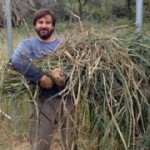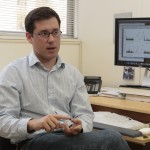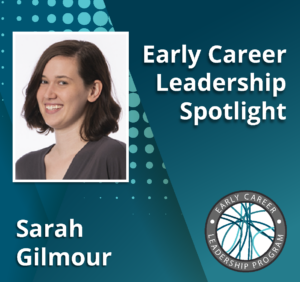GENETICS and G3 are excited to welcome new editors and to announce editorial changes for the current quarter.
- GENETICS Senior Editors: Karl Broman, Nick H. Barton, Oliver Hobert, and Audrey Gasch
- GENETICS Associate Editors: Oliver Rando, Kirsten Bomblies, Giovanni Bosco, Graham Coop, Thomas E. Juenger, Alan Moses, John Novembre, Daven Presgraves, Valerie Reinke, and Nathan Springer
- G3 Associate Editors: Ross Houston, Mattias Jakobsson, Brian Oliver, Mick Watson, Arash Bashirullah, Cayetano Gonzalez, Brian D. Gregory, and Stephen L. Johnson
GENETICS Senior Editors
KARL BROMAN
University of Wisconsin–Madison
Genetics of Complex Traits

Karl Broman
Karl Broman is a Professor in the Department of Biostatistics & Medical Informatics at the University of Wisconsin–Madison, where his research focuses on statistical genetics. Karl is an applied statistician focusing on problems in genetics and genomics – particularly the analysis of meiotic recombination and the genetic dissection of complex traits in experimental organisms. His work has three parts: data analysis, methods development, and software development.
NICK H. BARTON
IST Austria
Theoretical Population Genetics

Nick H. Barton
Nick Barton is a Professor at IST Austria. He and his group study diverse topics in evolutionary genetics but focus on the evolution of populations that are distributed through space and that experience natural selection on many genes. Understanding how species adapt, and how they split into new species, requires understanding of spatial subdivision. Interactions between genes are important in species formation and in the response to selection. The recent flood of genomic data makes analysis of the interactions amongst large numbers of genes essential.
OLIVER HOBERT
Columbia University
Methods, Technology, & Resources

Oliver Hobert
Oliver Hobert is a Professor and HHMI Investigator at Columbia University. The main focus of the Hobert lab is to understand the gene regulatory control mechanisms that generate the astounding diversity of cell types in the nervous system. They study this problem using two specific experimental advantages of the Caenorhabditis elegans model system: forward genetic mutant screens and transgenic reporter gene analysis. The ease with which cis-regulatory control regions can be analyzed through transgenic reporter analysis has allowed them to study the problem of neuronal differentiation from an angle not commonly used. The underlying basis of the functional and anatomical diversity of cell types in the nervous system is the differential expression of neuron-type-specific gene batteries, composed of terminal differentiation genes whose products define the specific properties of a mature neuron throughout its lifetime (e.g., neurotransmitter-synthesizing enzymes, transporters, receptors).
AUDREY GASCH
University of Wisconsin–Madison
Genome & Systems Biology

Audrey Gasch
Audrey Gasch is an Associate Professor of Genetics at the University of Wisconsin–Madison. The Gasch lab is part of the Laboratory of Genetics and the Genome Center of Wisconsin and are members of the Department of Energy-funded Great Lakes Bioenergy Research Center (GLBRC). They use modern techniques in comparative & functional genomics, computational & systems biology, and genetics & molecular biology to study how cells sense their environment, detect problems, and then mount a multi-faceted response to protect themselves against stress. They study these topics in the budding yeast Saccharomyces cerevisiae as a model for basic biology. In addition to uncovering fundamental questions about basic biology, they also apply this information to producing sustainable and economical biofuels from cellulosic materials through research in the GLBRC. Because yeast stress is a critical bottleneck in generating economical fuels from available biomass, their research is advancing this area by using their knowledge to engineer yeast for industrial use.
GENETICS Associate Editors
OLIVER RANDO
University of Massachusetts Medical School

Oliver Rando
Oliver Rando is a Professor of Biochemistry and Molecular Pharmacology at the University of Massachusetts Medical School. The Rando lab is broadly interested in epigenetic inheritance but specifically focuses on one putative carrier of epigenetic information – the nucleoprotein complex known as chromatin. They utilize genomics tools to measure chromatin structure over entire genomes at single-nucleosome resolution with the eventual goal of determining how chromatin states are established and maintained.
KIRSTEN BOMBLIES
John Innes Center

Kirsten Bomblies
Kirsten Bomblies is a project leader in Cell and Developmental Biology at the John Innes Center. She is interested in understanding how the genes that control meiosis evolve in response to genome duplication and environmental stresses. Meiosis is a specialized type of cell division that results in gametes or sex cells. These cells have half the number of chromosomes normally found in the organism and are essential for fertility in most sexually reproducing species. She uses Arabidopsis arenosa as her model to study the evolution of meiosis, which is a close relative to the commonly used model organism, Arabidopsis thaliana.
GIOVANNI BOSCO
Geisel School of Medicine at Dartmouth College

Giovanni Bosco
Giovanni Bosco is an Associate Professor of Genetics at Darmouth. The Bosco lab is interested in understanding how nuclear architecture, chromosome morphology and chromatin structure are modified in response to developmental cues and environmental factors. They are also interested in elucidating the molecular mechanisms through which these modifications function and effect specialized cellular processes.
GRAHAM COOP
UC Davis

Graham Coop
Graham Coop is an Associate Professor of Population Biology and Evolution & Ecology at UC Davis. The Coop lab’s research focuses on understanding the evolutionary forces that have shaped genetic differences between individuals, populations, and closely related species. A unifying principal of their work is the blending together of modeling and data analysis.
THOMAS E. JUENGER
University of Texas at Austin

Thomas E. Juenger
Thomas Juenger is a Professor in the Department of Integrative Biology at the University of Texas at Austin. His research focuses on the interface of ecological and evolutionary processes in natural plant populations. He is interested in phenotypic evolution and has studied a number of systems over the course of his career. The lab is currently focused on the identification and characterization of genes underlying variation in drought adaptation among Arabidopsis thaliana ecotypes collected from around the world. This work is motivated by a desire to understand how climate and habitat variation have influenced the evolution of plant physiology. In addition, Juenger is interested in the ecology and evolution of plant-animal interactions, including projects focused on pollination biology and herbivory in natural scarlet gilia (Ipomopsis aggregata) populations. Most recently, the lab has initiated studies of physiology and genomics in biofuel crops, including switchgrass (Panicum) and false brome (Brachypodium). A common theme of their work is the interplay of genetic and functional studies, usually coupling quantitative genetic experiments, population genetic approaches, and selection analyses in studies of natural genetic variation.
ALAN MOSES
University of Toronto

Alan Moses
Alan Moses is an Associate Professor at the University of Toronto, where he is part of the Departments of Cell & Systems Biology, Computer Science and Ecology and Evolutionary Biology. Research in the Moses lab is focused on two major areas: regulatory networks & systems and population genomics. Their work on regulatory networks & systems aims to understand two basic questions: 1) how gene regulation is encoded in DNA and protein sequences, and 2) how gene regulation evolves. They quantify changes in the sequences that specify gene regulation and develop mathematical modeling methods to study evolution of regulatory networks. They are also investigating how genetic differences in yeast are distributed in the population, applying mathematical models of molecular evolution to predict how natural selection and genetic drift affect mutations in functional sequences.
JOHN NOVEMBRE
University of Chicago

John Novembre
John Novembre is an Associate Professor in Human Genetics at the University of Chicago. The Novembre research group uses computational tools to study genetic diversity in natural populations. Their goal is to develop widely used statistical methods for intelligently extracting information from large-scale genomic data with the aim to improve understanding of: (1) basic genomic biology, (2) the biology of heritable disease traits, (3) the genetic basis of evolutionary processes, and (4) the history and evolution of various species, especially humans. From a disciplinary perspective, most of the ideas they use are from theoretical population genetics, statistical genetics, and computational statistics. Much of their work is invigorated by addressing data from emerging genotyping and sequencing technologies applied to large or particularly interesting population samples.
DAVEN PRESGRAVES
University of Rochester

Daven Presgraves
Daven Presgraves is a Professor at the Unversity of Rochester. The Presgraves lab studies the molecular and evolutionary genetics of the origin of new species, focusing on the evolution of interspecific genetic incompatibilities that cause sterility or inviability in species hybrids. Their long-term goal is to identify and characterize a large panel of hybrid incompatibility genes, providing the material to allow broad generalizations about the evolution of postzygotic reproductive isolation. One of the surprises from their work is that many incompatibilities in Drosophila appear to evolve as by-products of evolutionary arms races between selfish genetic elements and the genes in the host genome
VALERIE REINKE
Yale University

Valerie Reinke
Valerie Reinke is an Associate Professor of Genetics at Yale University. Her work focuses on germ cells. Because germ cells are the repository of the future, the genome of these cells must be protected from mutations and other forms of damage. However, germ cells are not simply passive carriers of genetic information, but must also undergo complex events such as meiosis, gametogenesis, and fertilization. To correctly implement these programs while preserving genome integrity, germ cells have a unique arsenal of tricks to control genes during germ cell development and function. The nematode C. elegans is an ideal model system for exploring gene regulation in germ cells because it provides powerful genetics, cell biology, and genomics approaches to address outstanding questions in the field. Currently, the Reinke lab is investigating multiple transcriptional and epigenetic mechanisms that distinguish the germ cell fate from the somatic cell fate.
NATHAN SPRINGER
University of Minnesota

Nathan Springer
Nathan Springer is a Professor in the Department of Plant Biology at the University of Minnesota. The Springer group uses a combination of classical genetics, molecular genetics and genomics approaches to study molecular variation and inheritance in maize. Heritable variation within a species can include DNA sequence changes that affect the quality of gene products, DNA sequence changes that influence expression levels of genes or epigenetic variation that can influence expression levels without requiring DNA sequence changes. The Springer lab focuses on studying the genetic and epigenetic mechanisms that lead to variation in gene expression levels. Many of their current studies are focused on how genetic variation, such as transposon insertions, and epigenetic variation influences chromatin modifications such as DNA methylation. They utilize genomic technologies to profile the epigenome of maize in different genotypes, tissue or environmental conditions to understand the factors that influence variation in chromatin modifications.
G3 Associate Editors
ROSS HOUSTON
The Roslin Institute, University of Edinburgh

Ross Houston
Ross Houston is a group leader at The Roslin Institute, University of Edinburgh where he studies the genomic regulation of host resistance to disease in aquaculture species. He has experience of applying high-throughput sequencing techniques for genetic marker discovery and genotyping (i.e. genotyping by sequencing) in farmed fish and shellfish. His research has included the discovery of major loci affecting resistance to viral disease in salmon, and the development of high density SNP arrays, and the application of genomic selection for disease resistance in aquaculture
MATTIAS JAKOBSSON
Uppsala University

Mattias Jackobsson
Mattias Jackobsson is a Professor of Genetics at Uppsala University. The Jakobsson lab’s research focuses on understanding evolutionary and demographic processes by using mathematical models and developing and utilizing statistical and computational methods for analyzing large genomic data sets. Specifically, they are interested in: human evolutionary genetics and inferring demographic history based population-genetic data, theoretical population genetics, developing methods for searching for genes targeted by recent selection, models of founder events and their implications for patterns of genetic variation, and the impact of demography on gene-mapping.
BRIAN OLIVER
NIDDK, National Institutes of Health

Brian Oliver
Brian Oliver is a Section Chief at the National Institute of Diabetes and Digestive and Kidney Diseases at the NIH. The Oliver lab’s ultimate goal is to determine how the collective action of genes results in an individual with specific characteristics and disease susceptibilities. Drosophila melanogaster is an important functional model system, boasting facile genetics, complex organ systems, complex behaviors, and a sequenced genome. The Oliver lab’s long-term goal is to develop predictive models of gene function. Their approach relies on high-throughput techniques used to profile biological processes such as expression, promoter occupancy, and chromatin status, in conjunction with computational analysis and genetics. Subtle perturbations in gene networks are likely to cause much of inherited disease susceptibility, but understanding how complex genotypes and environmental interactions result in disease will require experimental systems biology using model organisms. Predictive models for gene and pathway function will be important for diagnosis and ultimately intervention, fulfilling the promise of the human genome project.
MICK WATSON
The Roslin Insitute, University of Edinburgh

Mick Watson
Mick Watson is the Director of ARK-Genomics at the University of Edinburgh. The Watson lab speclializes in integration and analysis of multiple post-genomic datasets, including microarray, proteomics, genomics and SNP data, with an emphasis on a whole-systems approach. Their research involves prediction and analysis of genes and regulatory regions in eukaryotic genomes of importance to animal health, including chicken, bovine and Eimeria tenella. They also perform in silico analysis of the structure and function of pathogen and mammalian microRNAs with an emphasis on their impact on animal health and disease. The Watson lab performs comparative-genomic analysis of bacterial genomes with an emphasis on the prediction of virulence and pathogenicity factors and determinants of host-specificity
ARASH BASHIRULLAH
University of Wisconsin–Madison

Arash Bashirullah
Arash Bashirullah is an Associate Professor at the University of Wisconsin–Madison. His research program uses forward genetic approaches, built on a large collection of “late lethal” mutations, to identify mechanisms critical to the larval-to-adult transition at the onset of metamorphosis. Development after embryogenesis often requires remodeling of existing tissues. This tissue remodeling is accomplished through carefully orchestrated changes in cell shape, movement, growth and death. Tissue repair and regeneration also require activation of remodeling mechanisms. However, how these distinct cellular processes are coordinated during tissue remodeling remains poorly understood. The Bashirullah lab studies the genetic control of Drosophila metamorphosis, a stage when tissue remodeling transforms a crawling larva into a flying adult. They have identified hundreds of lethal mutations that specifically disrupt metamorphosis. Among these mutations, they have selected those required for proper control of growth and death. Most of these metamorphosis-specific mutations map to novel genes, suggesting that studying these genes will provide new insights into the regulation of tissue development and homeostasis.
CAYETANO GONZALEZ
IRB Barcelona

Cayetano Gonzalez
Cayetano Gonzalez is a group leader the IRB Barcelona. The Gonzalez lab uses cancer models in flies to understand the cellular changes that drive malignant growth and to identify conserved mechanisms that might be relevant for human cancer. Ongoing research lines in the lab include the oncogenic contribution of perturbed self-renewing asymmetric division, ectopic expression of germline genes, and genome instability. The lab also maintains an active line of research to identify new centrosomal proteins and found some with human orthologs that are linked to human pathologies. The lab develops and makes extensive use of microscopy techniques.
BRIAN D. GREGORY
University of Pennsylvania

Brian Gregory
Brian D. Gregory is an Assistant Professor of Biology at the University of Pennsylvania. His research focuses on unraveling the molecular mechanisms governing the regulation and function of RNA silencing pathways. RNA silencing is a highly conserved pathway that controls gene expression post-transcriptionally. A number of the key components of these pathways have been identified, but there are many still to be isolated and characterized. The Gregory lab’s research has concentrated on identifying novel proteins (including those involved in RNA stability/degradation) that are required for the metabolism of various classes of smRNAs and how these factors regulate specific RNA silencing pathways. Using a combination of genetics, biochemistry, and sequencing techniques, their results revealed unexpected connections between RNA metabolism and silencing pathways. They use genomic, bioinformatic, and systems biology approaches with molecular genetic and biochemical techniques to identify and characterize additional components required for the metabolism of various classes of smRNAs, as well as proteins involved in the regulation of specific smRNA populations and RNA silencing pathways in Arabidopsis thaliana and Drosophila.
STEPHEN L. JOHNSON
Washington University

Stephen L. Johnson
Stephen L. Johnson is a Professor in Genetics at Washington University. The Johnson lab is interested in growth control and morphogenesis in zebrafish development. They study the pigment pattern and the control of size and regeneration of the fin. Their basic approach is to identify mutations that affect adult pigment stripe pattern or fin growth and regeneration and analyze the mutations in singly or multiply mutant fish to identify the tissues and genetic pathways affected. Additionally, they are trying to identify the genes affected by the mutations and are working to develop genetic and physical maps that will lead to isolation of these genes.













